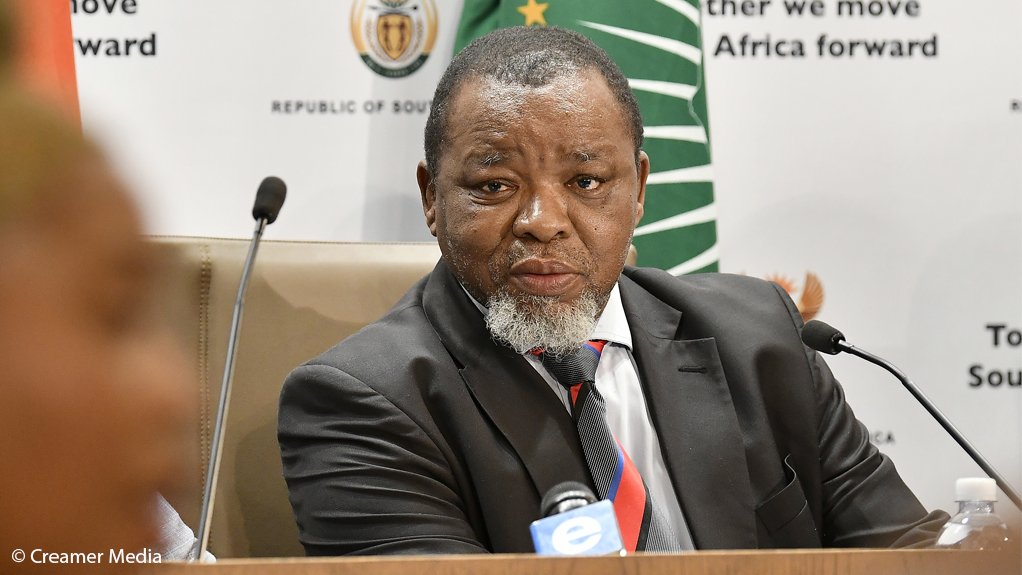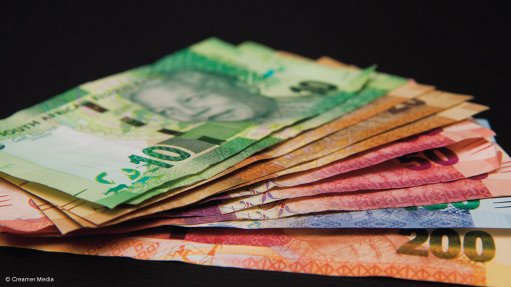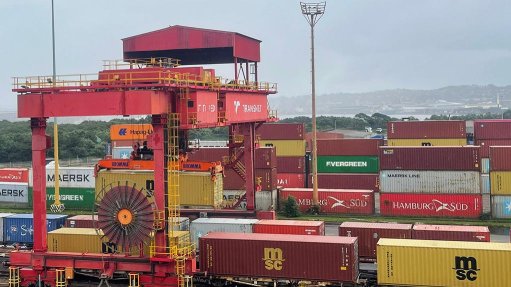Shift from high- to low-carbon must be systematic and just – Mantashe


Mineral Resources and Energy Minister Gwede Mantashe
Photo by Creamer Media's Donna Slater
South Africa’s Mineral Resources and Energy Minister, Gwede Mantashe, used the platform created by the International Energy Agency (IEA) Clean Energy Transitions Summit on July 9 to stress that South Africa’s shift from a high-carbon to a low-carbon path needed to be both systematic and just.
Speaking during the virtual event, which was opened by United Nations Secretary-General António Guterres, attended by energy ministers from 40 countries and viewed by thousands online, Mantashe insisted that South Africa’s Integrated Resource Plan 2019 (IRP 2019) would guide the diversification of the country’s electricity mix, which is currently dominated by coal.
The IRP 2019 envisages the energy contribution of coal falling, partly through decommissioning of old stations, from over 75% currently to about 59% by 2030 and the contribution of renewable energy rising from 7% to about 24% over the same period.
This renewables contribution would arise primarily from the integration of more than 14 000 MW of new wind and some 6 000 MW of new solar photovoltaic (PV) generation by 2030. In addition it is anticipated that the bulk of the allocation for distributed generation would arise in the form of solar PV.
South Africa was also aiming to integrate 5 000 MW of storage and import 2 500 MW of new hydro from the Inga scheme in the Democratic Republic of Congo.
Mantashe suggested during the summit, however, that the hydro allocation might be displaced by small modular nuclear reactors should the hydro scheme fail to be implemented on time.
In addition, the plan caters for 1 500 MW of new coal and 3 000 MW of gas to power.
The Minister insisted that South Africa’s priority was to deliver affordable and universal access to electricity, while honouring the commitments it had made under the Paris Agreement to reduce its carbon emissions.
The South African government would, thus, resist “pressure” to narrow its policy focus to emissions alone, particularly given that Africa as a whole “contributes between 2% and 3% of global carbon emissions”.
The Minister described South Africa key challenge as being the ability to develop “connected capacity that can be used to give access to everybody – that is our biggest preoccupation”.
“[To do so] we are subscribing to the concept of a just transition, and a just transition cannot mean jumping like a pendulum from one end to the other. It will mean systematic transitioning from one era to the next,” Mantashe explained.
“We think we are positioning ourselves to manage that carefully, despite the pressures, because sometimes when you are a weaker economy you get pushed to do things that are almost like self-destruction.
“We are resisting that, we will do what we can do so that we give electricity to our people at an affordable price and transition from high emissions to low emissions over a period.”
Article Enquiry
Email Article
Save Article
Feedback
To advertise email advertising@creamermedia.co.za or click here
Announcements
What's On
Subscribe to improve your user experience...
Option 1 (equivalent of R125 a month):
Receive a weekly copy of Creamer Media's Engineering News & Mining Weekly magazine
(print copy for those in South Africa and e-magazine for those outside of South Africa)
Receive daily email newsletters
Access to full search results
Access archive of magazine back copies
Access to Projects in Progress
Access to ONE Research Report of your choice in PDF format
Option 2 (equivalent of R375 a month):
All benefits from Option 1
PLUS
Access to Creamer Media's Research Channel Africa for ALL Research Reports, in PDF format, on various industrial and mining sectors
including Electricity; Water; Energy Transition; Hydrogen; Roads, Rail and Ports; Coal; Gold; Platinum; Battery Metals; etc.
Already a subscriber?
Forgotten your password?
Receive weekly copy of Creamer Media's Engineering News & Mining Weekly magazine (print copy for those in South Africa and e-magazine for those outside of South Africa)
➕
Recieve daily email newsletters
➕
Access to full search results
➕
Access archive of magazine back copies
➕
Access to Projects in Progress
➕
Access to ONE Research Report of your choice in PDF format
RESEARCH CHANNEL AFRICA
R4500 (equivalent of R375 a month)
SUBSCRIBEAll benefits from Option 1
➕
Access to Creamer Media's Research Channel Africa for ALL Research Reports on various industrial and mining sectors, in PDF format, including on:
Electricity
➕
Water
➕
Energy Transition
➕
Hydrogen
➕
Roads, Rail and Ports
➕
Coal
➕
Gold
➕
Platinum
➕
Battery Metals
➕
etc.
Receive all benefits from Option 1 or Option 2 delivered to numerous people at your company
➕
Multiple User names and Passwords for simultaneous log-ins
➕
Intranet integration access to all in your organisation



















